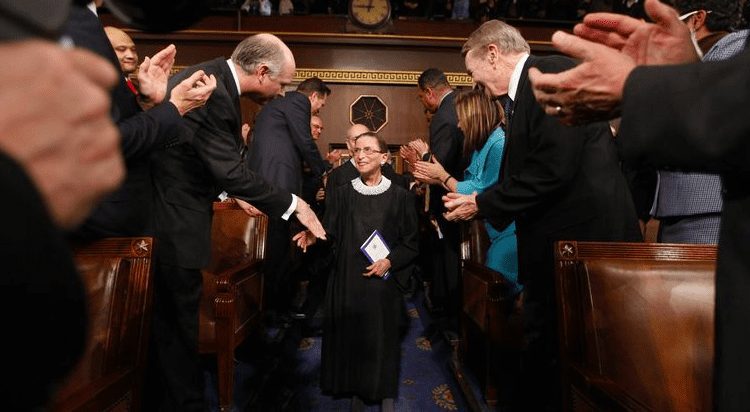Ruth Bader Ginsburg becomes the first woman and the first Jewish woman to lie in state at US Capitol


Family, friends and elected officials gathered in the US Capitol building to honour the memory of the late Supreme Court justice, Ruth Bader Ginsberg who died on September 18, 2020. Justice Ginsberg became the first woman and the first Jewish woman to lie in state at US Capitol.
Her demise was a personal loss for many. People came together to bid adieu to the woman who devoted her life for gender equality and justice. When Nanette Barragán, Democrat of California, reached out to touch Justice Ruth Bader Ginsburg’s coffin at the Capitol, there was an outpouring: Multiple women gently pressed their hands to it, some after placing their hands to their lips first.
The speaker Nancy Pelosi said, “It is with profound sorrow and deep sympathy to the Ginsburg family that I have the high honor to welcome Justice Ruth Bader Ginsburg to lie in state in the Capitol of the United States.”
“She won equality for women and men, not in one swift victory, but brick by brick, case by case, through meticulous, careful lawyering. She changed the course of American law,” Rabbi Lauren Holtzblatt spoke as she paid tribute to the legend.
Bryant Johnson, Ruth Bader Ginsburg’s personal trainer’s video of doing push-ups as a mark of respect and tribute to Ruth Ginsberg touched the hearts of millions.
Everyone irrespective of their gender, ethnicity, race, colour grieved the passing away of a dissenter, an activist who taught us to unite and fight for the things that matter to us.
She said, “Fight for the things that you care about, but do it in a way that will lead others to join you.” Her fight brought all of us together, her words are here to inspire generations to come.
Paying our solemn tribute to the visionary Justice Ruth Bader Ginsberg.
We leave you with 5 path-breaking laws that she helped pass to change the American society forever and for good.
1. Employers cannot discriminate against employees based on gender or reproductive choices
ACLU Women’s Rights Project attorney Susan Deller Ross and Ginsburg pushed to have pregnancy discrimination recognized as a form of sex discrimination, according to the ACLU. The pair is credited for helping pass the Pregnancy Discrimination Act, an amendment to Title VII in 1978 which acknowledges pregnancy discrimination as unlawful.
2. State-funded schools must admit women
In 1996, Ginsburg led the ruling decision in the United States v. Virginia case. Until then, women had been prohibited from attending the Virginia Military Institute. Ginsburg argued that rather than create a separate women’s program, they should be allowed to join the same program as men.
3. Women’s right to financial independence and equal benefits
Ginsburg’s work paved the way for the Equal Credit Opportunity Act, which passed in1974 and allowed women to apply for bank accounts, credit cards, and mortgages without a male co-signer. She also helped ensure that women could receive the same military housing allowances as men, and women are no longer required to pay more for pension plans than men to receive the same benefits, according to the ACLU.
4. Men are entitled to the same caregiving and Social Security rights as women
In the 1970s, Ginsburg later won two cases representing men who were not granted survivor benefits under Social Security because they were men. The case set the standards for how sex-based lawes are evaluated under the constitution.
5. Juries must include women
Up until 1979, jury duty was considered optional for women in the US. Several states argued that women should be exempt from participating due to family and household obligations. Ginsburg fought to require women to serve on juries on the basis that their civic duty should be valued the same as men’s.

“Feminism [is the] notion that we should each be free to develop our own talents and not be held back by man-made barriers,” Ginsburg wrote in her 2016 book “My Own Words.”
Featured image: Fox News
